Contract Law Project: Analysis of George and Archie's Agreement
VerifiedAdded on 2022/08/18
|7
|1719
|19
Project
AI Summary
This project provides a comprehensive analysis of a contract law scenario involving two childhood friends, George and Archie. The analysis begins by identifying the issue: whether a valid contract existed and if there was a breach, leading to potential damages. The assignment then outlines relevant English common law principles, including the essential elements of a contract: offer and acceptance, intention to create legal relations, fulfillment of promises, legal capacity, and certainty. It applies these principles to the facts, differentiating between an invitation to treat and an offer, and examining the validity of verbal and written contracts. The analysis highlights the importance of offer and acceptance in contract formation. The project concludes that a breach of contract occurred when Archie decided not to sell the farmhouse, entitling George to claim damages. The analysis is supported by case laws like Carlill v Carbolic Smoke Ball Company, Chapelton v Barry Urban District Council, and Smith v Hughes.
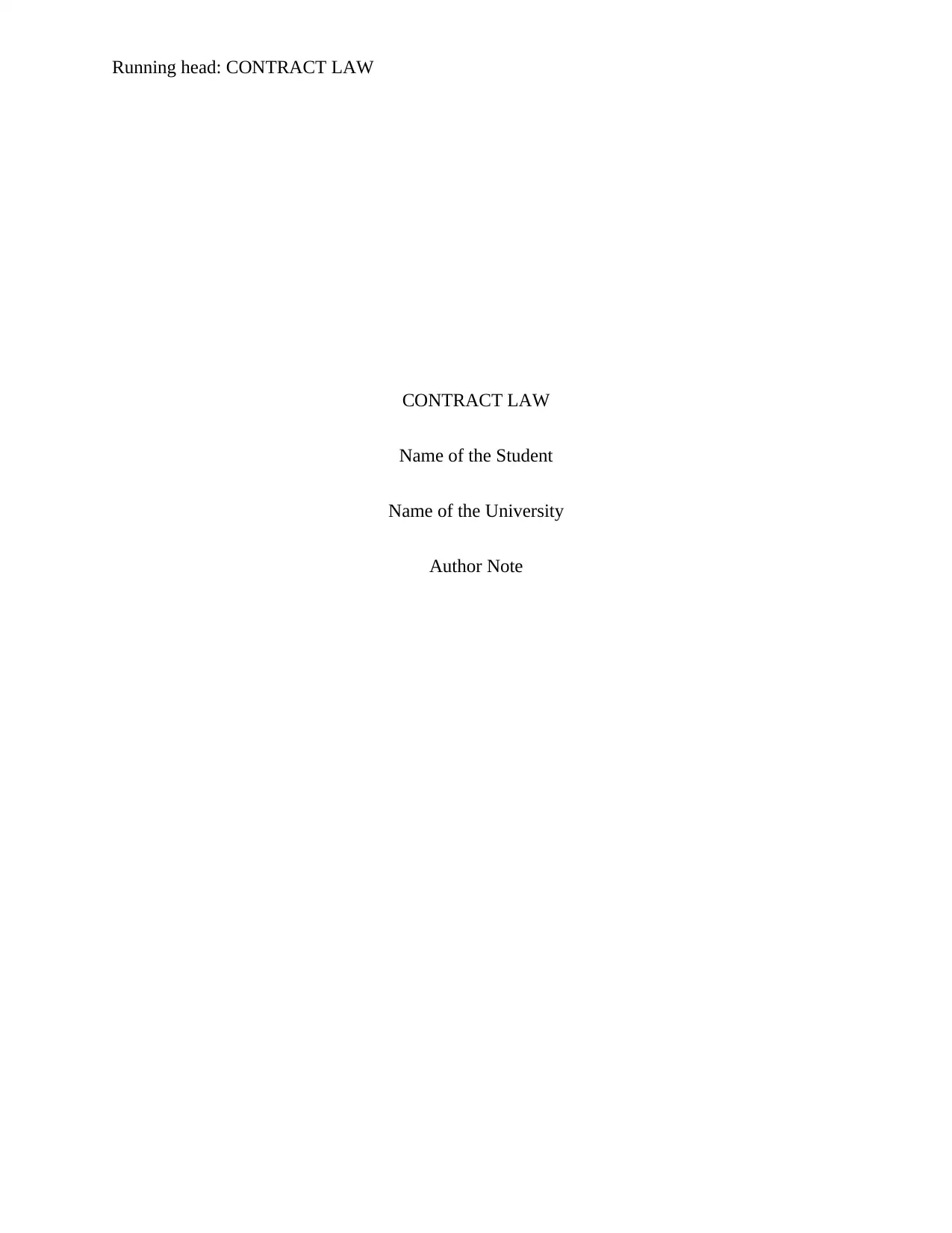
Running head: CONTRACT LAW
CONTRACT LAW
Name of the Student
Name of the University
Author Note
CONTRACT LAW
Name of the Student
Name of the University
Author Note
Paraphrase This Document
Need a fresh take? Get an instant paraphrase of this document with our AI Paraphraser
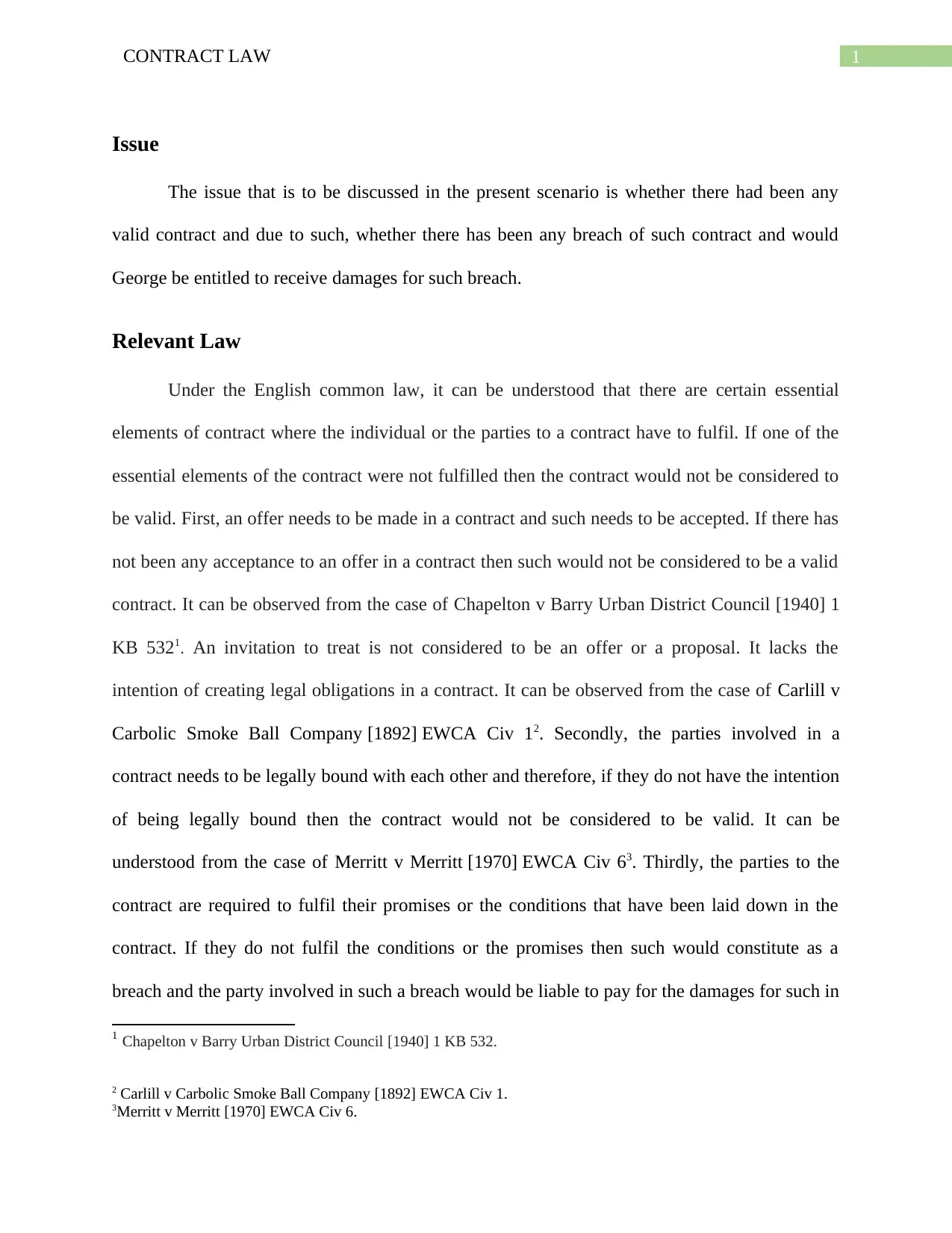
1CONTRACT LAW
Issue
The issue that is to be discussed in the present scenario is whether there had been any
valid contract and due to such, whether there has been any breach of such contract and would
George be entitled to receive damages for such breach.
Relevant Law
Under the English common law, it can be understood that there are certain essential
elements of contract where the individual or the parties to a contract have to fulfil. If one of the
essential elements of the contract were not fulfilled then the contract would not be considered to
be valid. First, an offer needs to be made in a contract and such needs to be accepted. If there has
not been any acceptance to an offer in a contract then such would not be considered to be a valid
contract. It can be observed from the case of Chapelton v Barry Urban District Council [1940] 1
KB 5321. An invitation to treat is not considered to be an offer or a proposal. It lacks the
intention of creating legal obligations in a contract. It can be observed from the case of Carlill v
Carbolic Smoke Ball Company [1892] EWCA Civ 12. Secondly, the parties involved in a
contract needs to be legally bound with each other and therefore, if they do not have the intention
of being legally bound then the contract would not be considered to be valid. It can be
understood from the case of Merritt v Merritt [1970] EWCA Civ 63. Thirdly, the parties to the
contract are required to fulfil their promises or the conditions that have been laid down in the
contract. If they do not fulfil the conditions or the promises then such would constitute as a
breach and the party involved in such a breach would be liable to pay for the damages for such in
1 Chapelton v Barry Urban District Council [1940] 1 KB 532.
2 Carlill v Carbolic Smoke Ball Company [1892] EWCA Civ 1.
3Merritt v Merritt [1970] EWCA Civ 6.
Issue
The issue that is to be discussed in the present scenario is whether there had been any
valid contract and due to such, whether there has been any breach of such contract and would
George be entitled to receive damages for such breach.
Relevant Law
Under the English common law, it can be understood that there are certain essential
elements of contract where the individual or the parties to a contract have to fulfil. If one of the
essential elements of the contract were not fulfilled then the contract would not be considered to
be valid. First, an offer needs to be made in a contract and such needs to be accepted. If there has
not been any acceptance to an offer in a contract then such would not be considered to be a valid
contract. It can be observed from the case of Chapelton v Barry Urban District Council [1940] 1
KB 5321. An invitation to treat is not considered to be an offer or a proposal. It lacks the
intention of creating legal obligations in a contract. It can be observed from the case of Carlill v
Carbolic Smoke Ball Company [1892] EWCA Civ 12. Secondly, the parties involved in a
contract needs to be legally bound with each other and therefore, if they do not have the intention
of being legally bound then the contract would not be considered to be valid. It can be
understood from the case of Merritt v Merritt [1970] EWCA Civ 63. Thirdly, the parties to the
contract are required to fulfil their promises or the conditions that have been laid down in the
contract. If they do not fulfil the conditions or the promises then such would constitute as a
breach and the party involved in such a breach would be liable to pay for the damages for such in
1 Chapelton v Barry Urban District Council [1940] 1 KB 532.
2 Carlill v Carbolic Smoke Ball Company [1892] EWCA Civ 1.
3Merritt v Merritt [1970] EWCA Civ 6.
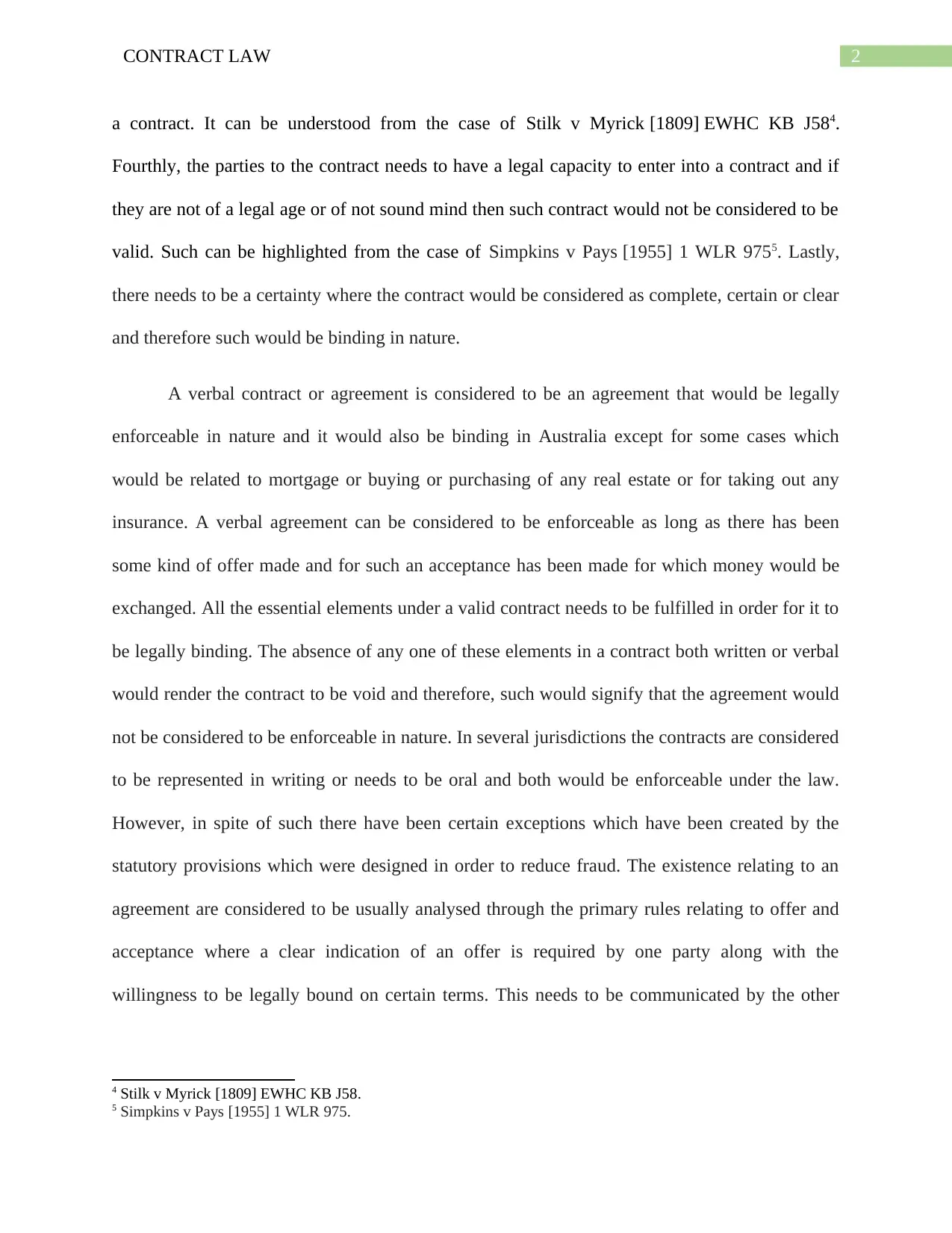
2CONTRACT LAW
a contract. It can be understood from the case of Stilk v Myrick [1809] EWHC KB J584.
Fourthly, the parties to the contract needs to have a legal capacity to enter into a contract and if
they are not of a legal age or of not sound mind then such contract would not be considered to be
valid. Such can be highlighted from the case of Simpkins v Pays [1955] 1 WLR 9755. Lastly,
there needs to be a certainty where the contract would be considered as complete, certain or clear
and therefore such would be binding in nature.
A verbal contract or agreement is considered to be an agreement that would be legally
enforceable in nature and it would also be binding in Australia except for some cases which
would be related to mortgage or buying or purchasing of any real estate or for taking out any
insurance. A verbal agreement can be considered to be enforceable as long as there has been
some kind of offer made and for such an acceptance has been made for which money would be
exchanged. All the essential elements under a valid contract needs to be fulfilled in order for it to
be legally binding. The absence of any one of these elements in a contract both written or verbal
would render the contract to be void and therefore, such would signify that the agreement would
not be considered to be enforceable in nature. In several jurisdictions the contracts are considered
to be represented in writing or needs to be oral and both would be enforceable under the law.
However, in spite of such there have been certain exceptions which have been created by the
statutory provisions which were designed in order to reduce fraud. The existence relating to an
agreement are considered to be usually analysed through the primary rules relating to offer and
acceptance where a clear indication of an offer is required by one party along with the
willingness to be legally bound on certain terms. This needs to be communicated by the other
4 Stilk v Myrick [1809] EWHC KB J58.
5 Simpkins v Pays [1955] 1 WLR 975.
a contract. It can be understood from the case of Stilk v Myrick [1809] EWHC KB J584.
Fourthly, the parties to the contract needs to have a legal capacity to enter into a contract and if
they are not of a legal age or of not sound mind then such contract would not be considered to be
valid. Such can be highlighted from the case of Simpkins v Pays [1955] 1 WLR 9755. Lastly,
there needs to be a certainty where the contract would be considered as complete, certain or clear
and therefore such would be binding in nature.
A verbal contract or agreement is considered to be an agreement that would be legally
enforceable in nature and it would also be binding in Australia except for some cases which
would be related to mortgage or buying or purchasing of any real estate or for taking out any
insurance. A verbal agreement can be considered to be enforceable as long as there has been
some kind of offer made and for such an acceptance has been made for which money would be
exchanged. All the essential elements under a valid contract needs to be fulfilled in order for it to
be legally binding. The absence of any one of these elements in a contract both written or verbal
would render the contract to be void and therefore, such would signify that the agreement would
not be considered to be enforceable in nature. In several jurisdictions the contracts are considered
to be represented in writing or needs to be oral and both would be enforceable under the law.
However, in spite of such there have been certain exceptions which have been created by the
statutory provisions which were designed in order to reduce fraud. The existence relating to an
agreement are considered to be usually analysed through the primary rules relating to offer and
acceptance where a clear indication of an offer is required by one party along with the
willingness to be legally bound on certain terms. This needs to be communicated by the other
4 Stilk v Myrick [1809] EWHC KB J58.
5 Simpkins v Pays [1955] 1 WLR 975.
⊘ This is a preview!⊘
Do you want full access?
Subscribe today to unlock all pages.

Trusted by 1+ million students worldwide
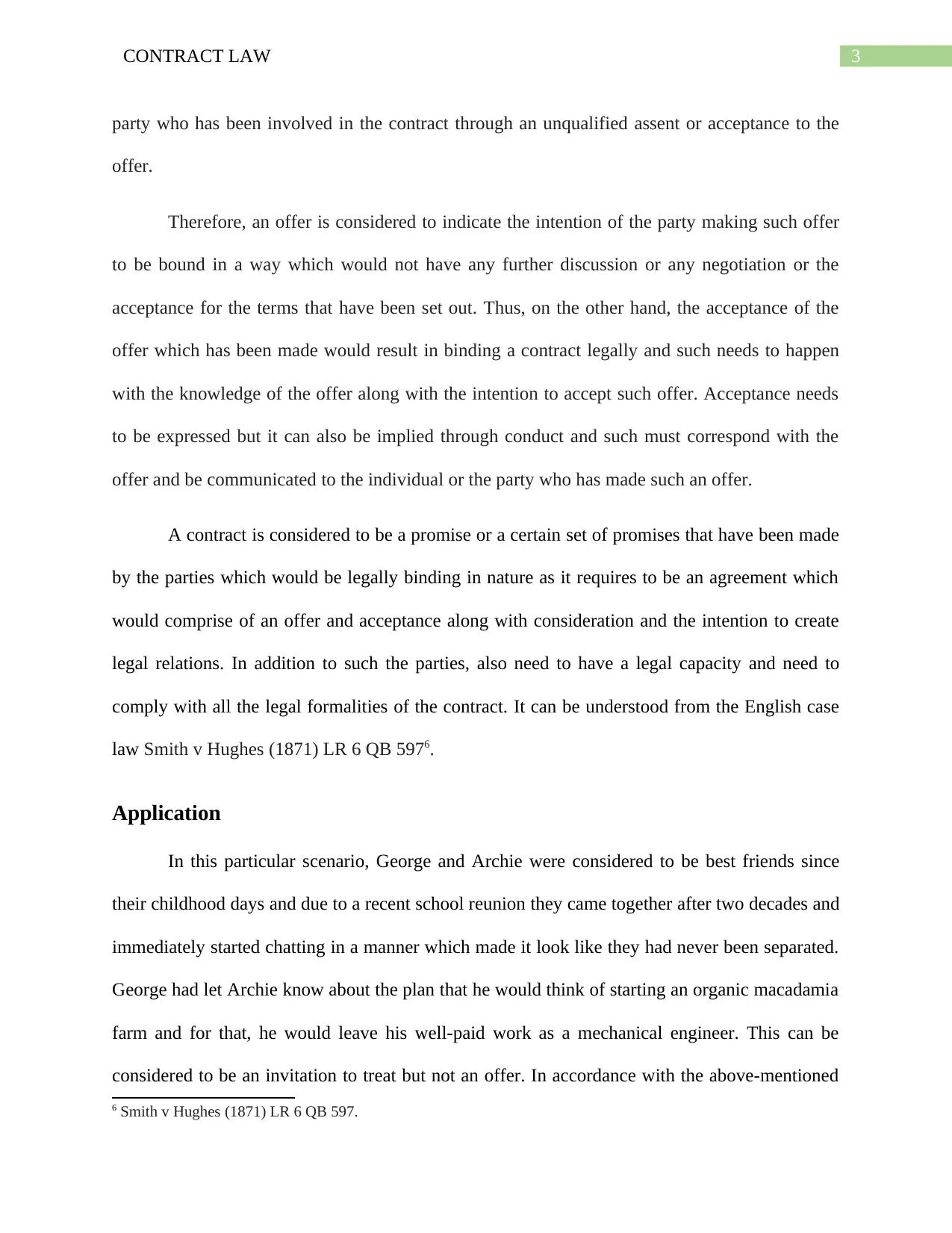
3CONTRACT LAW
party who has been involved in the contract through an unqualified assent or acceptance to the
offer.
Therefore, an offer is considered to indicate the intention of the party making such offer
to be bound in a way which would not have any further discussion or any negotiation or the
acceptance for the terms that have been set out. Thus, on the other hand, the acceptance of the
offer which has been made would result in binding a contract legally and such needs to happen
with the knowledge of the offer along with the intention to accept such offer. Acceptance needs
to be expressed but it can also be implied through conduct and such must correspond with the
offer and be communicated to the individual or the party who has made such an offer.
A contract is considered to be a promise or a certain set of promises that have been made
by the parties which would be legally binding in nature as it requires to be an agreement which
would comprise of an offer and acceptance along with consideration and the intention to create
legal relations. In addition to such the parties, also need to have a legal capacity and need to
comply with all the legal formalities of the contract. It can be understood from the English case
law Smith v Hughes (1871) LR 6 QB 5976.
Application
In this particular scenario, George and Archie were considered to be best friends since
their childhood days and due to a recent school reunion they came together after two decades and
immediately started chatting in a manner which made it look like they had never been separated.
George had let Archie know about the plan that he would think of starting an organic macadamia
farm and for that, he would leave his well-paid work as a mechanical engineer. This can be
considered to be an invitation to treat but not an offer. In accordance with the above-mentioned
6 Smith v Hughes (1871) LR 6 QB 597.
party who has been involved in the contract through an unqualified assent or acceptance to the
offer.
Therefore, an offer is considered to indicate the intention of the party making such offer
to be bound in a way which would not have any further discussion or any negotiation or the
acceptance for the terms that have been set out. Thus, on the other hand, the acceptance of the
offer which has been made would result in binding a contract legally and such needs to happen
with the knowledge of the offer along with the intention to accept such offer. Acceptance needs
to be expressed but it can also be implied through conduct and such must correspond with the
offer and be communicated to the individual or the party who has made such an offer.
A contract is considered to be a promise or a certain set of promises that have been made
by the parties which would be legally binding in nature as it requires to be an agreement which
would comprise of an offer and acceptance along with consideration and the intention to create
legal relations. In addition to such the parties, also need to have a legal capacity and need to
comply with all the legal formalities of the contract. It can be understood from the English case
law Smith v Hughes (1871) LR 6 QB 5976.
Application
In this particular scenario, George and Archie were considered to be best friends since
their childhood days and due to a recent school reunion they came together after two decades and
immediately started chatting in a manner which made it look like they had never been separated.
George had let Archie know about the plan that he would think of starting an organic macadamia
farm and for that, he would leave his well-paid work as a mechanical engineer. This can be
considered to be an invitation to treat but not an offer. In accordance with the above-mentioned
6 Smith v Hughes (1871) LR 6 QB 597.
Paraphrase This Document
Need a fresh take? Get an instant paraphrase of this document with our AI Paraphraser
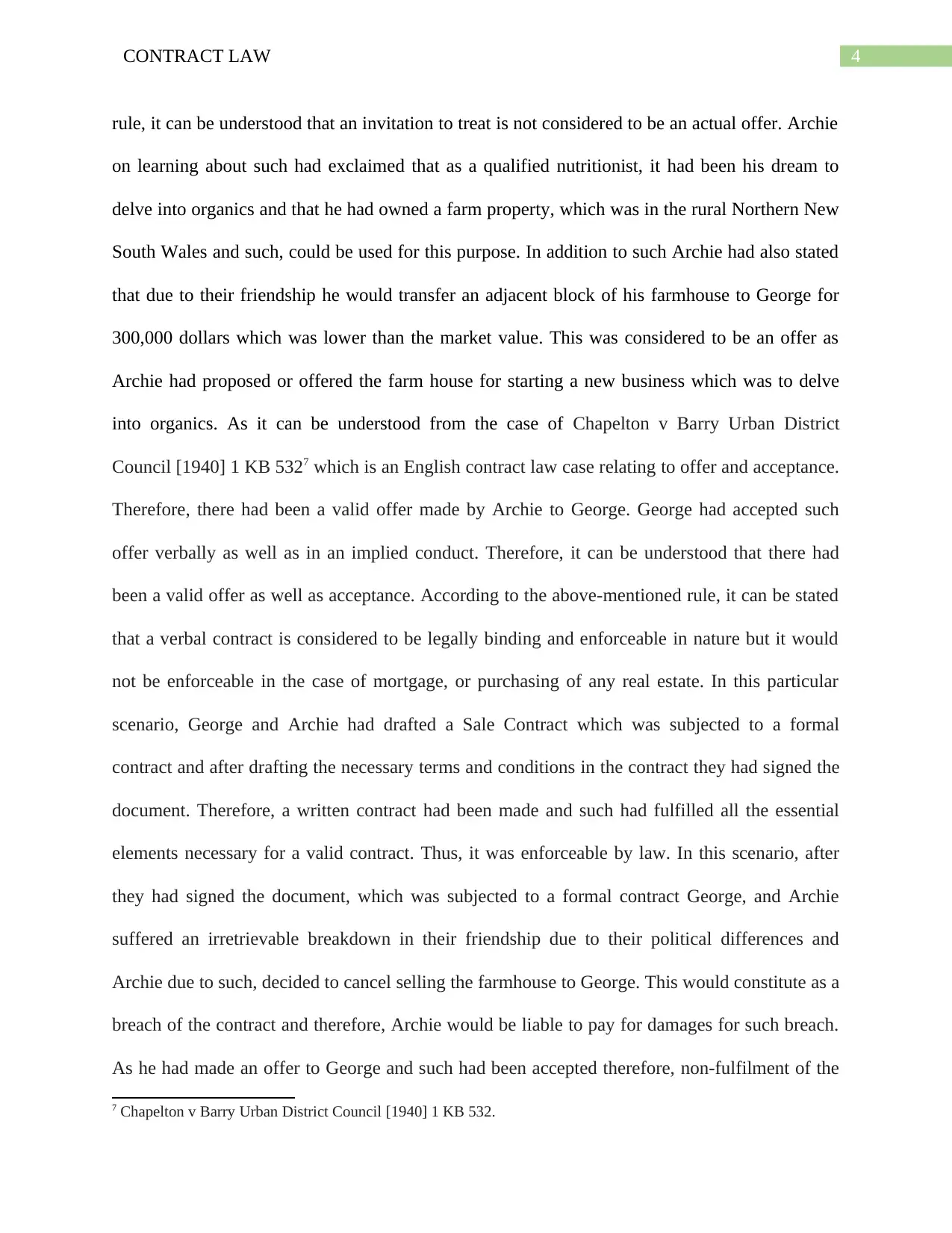
4CONTRACT LAW
rule, it can be understood that an invitation to treat is not considered to be an actual offer. Archie
on learning about such had exclaimed that as a qualified nutritionist, it had been his dream to
delve into organics and that he had owned a farm property, which was in the rural Northern New
South Wales and such, could be used for this purpose. In addition to such Archie had also stated
that due to their friendship he would transfer an adjacent block of his farmhouse to George for
300,000 dollars which was lower than the market value. This was considered to be an offer as
Archie had proposed or offered the farm house for starting a new business which was to delve
into organics. As it can be understood from the case of Chapelton v Barry Urban District
Council [1940] 1 KB 5327 which is an English contract law case relating to offer and acceptance.
Therefore, there had been a valid offer made by Archie to George. George had accepted such
offer verbally as well as in an implied conduct. Therefore, it can be understood that there had
been a valid offer as well as acceptance. According to the above-mentioned rule, it can be stated
that a verbal contract is considered to be legally binding and enforceable in nature but it would
not be enforceable in the case of mortgage, or purchasing of any real estate. In this particular
scenario, George and Archie had drafted a Sale Contract which was subjected to a formal
contract and after drafting the necessary terms and conditions in the contract they had signed the
document. Therefore, a written contract had been made and such had fulfilled all the essential
elements necessary for a valid contract. Thus, it was enforceable by law. In this scenario, after
they had signed the document, which was subjected to a formal contract George, and Archie
suffered an irretrievable breakdown in their friendship due to their political differences and
Archie due to such, decided to cancel selling the farmhouse to George. This would constitute as a
breach of the contract and therefore, Archie would be liable to pay for damages for such breach.
As he had made an offer to George and such had been accepted therefore, non-fulfilment of the
7 Chapelton v Barry Urban District Council [1940] 1 KB 532.
rule, it can be understood that an invitation to treat is not considered to be an actual offer. Archie
on learning about such had exclaimed that as a qualified nutritionist, it had been his dream to
delve into organics and that he had owned a farm property, which was in the rural Northern New
South Wales and such, could be used for this purpose. In addition to such Archie had also stated
that due to their friendship he would transfer an adjacent block of his farmhouse to George for
300,000 dollars which was lower than the market value. This was considered to be an offer as
Archie had proposed or offered the farm house for starting a new business which was to delve
into organics. As it can be understood from the case of Chapelton v Barry Urban District
Council [1940] 1 KB 5327 which is an English contract law case relating to offer and acceptance.
Therefore, there had been a valid offer made by Archie to George. George had accepted such
offer verbally as well as in an implied conduct. Therefore, it can be understood that there had
been a valid offer as well as acceptance. According to the above-mentioned rule, it can be stated
that a verbal contract is considered to be legally binding and enforceable in nature but it would
not be enforceable in the case of mortgage, or purchasing of any real estate. In this particular
scenario, George and Archie had drafted a Sale Contract which was subjected to a formal
contract and after drafting the necessary terms and conditions in the contract they had signed the
document. Therefore, a written contract had been made and such had fulfilled all the essential
elements necessary for a valid contract. Thus, it was enforceable by law. In this scenario, after
they had signed the document, which was subjected to a formal contract George, and Archie
suffered an irretrievable breakdown in their friendship due to their political differences and
Archie due to such, decided to cancel selling the farmhouse to George. This would constitute as a
breach of the contract and therefore, Archie would be liable to pay for damages for such breach.
As he had made an offer to George and such had been accepted therefore, non-fulfilment of the
7 Chapelton v Barry Urban District Council [1940] 1 KB 532.
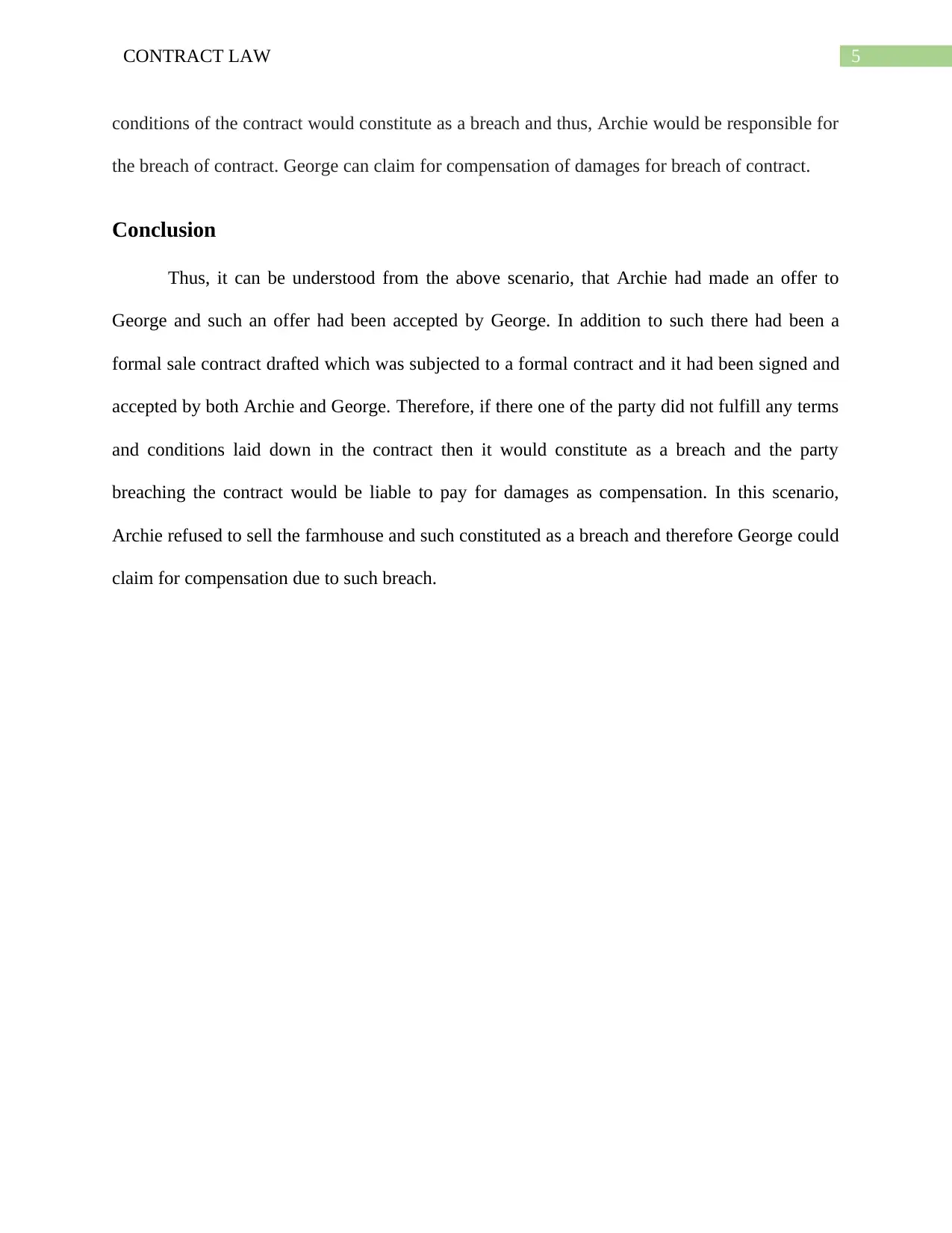
5CONTRACT LAW
conditions of the contract would constitute as a breach and thus, Archie would be responsible for
the breach of contract. George can claim for compensation of damages for breach of contract.
Conclusion
Thus, it can be understood from the above scenario, that Archie had made an offer to
George and such an offer had been accepted by George. In addition to such there had been a
formal sale contract drafted which was subjected to a formal contract and it had been signed and
accepted by both Archie and George. Therefore, if there one of the party did not fulfill any terms
and conditions laid down in the contract then it would constitute as a breach and the party
breaching the contract would be liable to pay for damages as compensation. In this scenario,
Archie refused to sell the farmhouse and such constituted as a breach and therefore George could
claim for compensation due to such breach.
conditions of the contract would constitute as a breach and thus, Archie would be responsible for
the breach of contract. George can claim for compensation of damages for breach of contract.
Conclusion
Thus, it can be understood from the above scenario, that Archie had made an offer to
George and such an offer had been accepted by George. In addition to such there had been a
formal sale contract drafted which was subjected to a formal contract and it had been signed and
accepted by both Archie and George. Therefore, if there one of the party did not fulfill any terms
and conditions laid down in the contract then it would constitute as a breach and the party
breaching the contract would be liable to pay for damages as compensation. In this scenario,
Archie refused to sell the farmhouse and such constituted as a breach and therefore George could
claim for compensation due to such breach.
⊘ This is a preview!⊘
Do you want full access?
Subscribe today to unlock all pages.

Trusted by 1+ million students worldwide
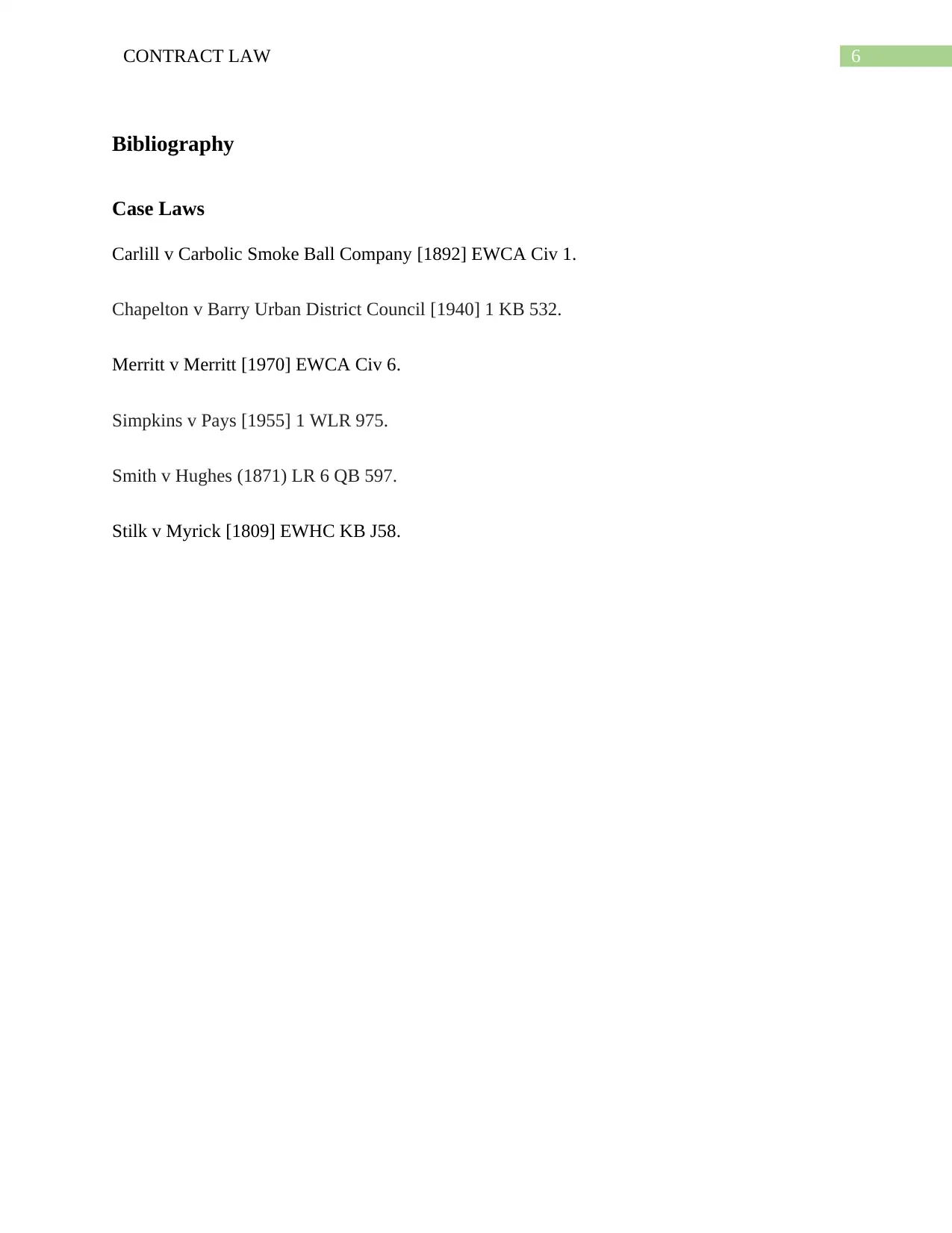
6CONTRACT LAW
Bibliography
Case Laws
Carlill v Carbolic Smoke Ball Company [1892] EWCA Civ 1.
Chapelton v Barry Urban District Council [1940] 1 KB 532.
Merritt v Merritt [1970] EWCA Civ 6.
Simpkins v Pays [1955] 1 WLR 975.
Smith v Hughes (1871) LR 6 QB 597.
Stilk v Myrick [1809] EWHC KB J58.
Bibliography
Case Laws
Carlill v Carbolic Smoke Ball Company [1892] EWCA Civ 1.
Chapelton v Barry Urban District Council [1940] 1 KB 532.
Merritt v Merritt [1970] EWCA Civ 6.
Simpkins v Pays [1955] 1 WLR 975.
Smith v Hughes (1871) LR 6 QB 597.
Stilk v Myrick [1809] EWHC KB J58.
1 out of 7
Related Documents
Your All-in-One AI-Powered Toolkit for Academic Success.
+13062052269
info@desklib.com
Available 24*7 on WhatsApp / Email
![[object Object]](/_next/static/media/star-bottom.7253800d.svg)
Unlock your academic potential
Copyright © 2020–2026 A2Z Services. All Rights Reserved. Developed and managed by ZUCOL.





